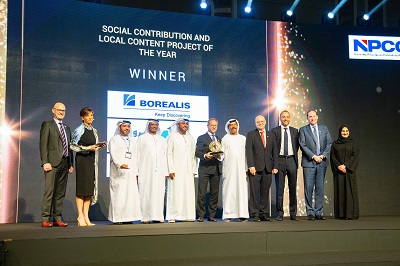Borouge, Borealis and NOVA Chemicals, the strategic partners that support Project STOP (Stop Ocean Plastics), announced that the initiative has received the Social Contribution and Local Content Project of the Year Award at the ADIPEC Awards 2019. These awards recognise outstanding contributions to the future of the oil and gas industry. The award was received at a ceremony in Abu Dhabi on 11 November 2019.
“We are proud to be a strategic partner of Project STOP, working with partners and communities, to establish a plastics circular economy for collection of waste,” said Ahmed Omar Abdulla, CEO of Abu Dhabi Polymers Company (Borouge). “Winning the prestigious 2019 ADIPEC award under the category ‘Social Contribution and Local Content Project of the Year’ fills us with pride and reinforces our commitment to give a new life to post-consumed plastics, provide socio-economic benefits while ensuring the wellbeing of people and making impact where we operate.”
Project STOP is a pioneering initiative that partners with cities to stop plastic waste leaking into the ocean. Borealis and SYSTEMIQ co-founded Project STOP in 2017. They have since been joined by like-minded strategic partners, which in addition to Borouge and NOVA Chemicals include the Norwegian Ministry of Foreign Affairs, Nestlé and the Alliance to End Plastic Waste, alongside its supporting partners Veolia, Schwarz Group and Sustainable Waste Indonesia.
“Project STOP is part of our wider EverMinds™ engagement,” says Alfred Stern, Borealis Chief Executive. “This is our strategic commitment to transforming the plastics industry into one that is more sustainable, more circular and more socially responsible. Ocean plastics are a complex challenge, which needs political, social, financial and technological interventions, across the value chain. Project STOP enables us to work with governments, authorities and other members of the value chain, to tackle this problem together.”

"We are pleased to see the progress Project STOP is making to find innovative solutions to solve the issue of plastic waste and promote a plastics circular economy in Indonesia,” said Todd Karran, president and CEO, NOVA Chemicals. “As a strategic partner of Project STOP and a founding member of the Alliance to End Plastic Waste, we know businesses like ours can be a positive catalyst for change. Working together, we can shape a world that is even better tomorrow than it is today,” Karran said.
The first city partnership project, in Muncar, Indonesia, started in 2018. To date, more than 30,000 people are served with waste collection for the first time in their lives. This has resulted in more than 1,800 tonnes of waste being collected and has created 60 full-time jobs. “Before Project STOP, especially the river, it was really dirty. You could not see the water, it was full of waste,” said Rahmat Hidyak, head of Tembok village in Muncar, where Project STOP has rolled out waste collection services. “I have high expectations of Project STOP’s impact. Because Project STOP is not just good, it’s fantastic.”
Plastics have changed human life for the better, from keeping food fresh to making cars more efficient. However, there is an urgent need to stop plastic waste leaking into the ocean. Around 80 percent of marine debris comes from land-based sources, with half coming from just five countries in Asia. Waste management has not kept pace with this growth, forcing people to dump or burn their waste and resulting in plastic ending up in rivers and oceans. Plastic waste in the environment negatively affects tourism, fishing, marine life and human health.
Project STOP takes a collaborative and holistic approach to stop plastic leakage at the source, while working towards a circular economy. Through its “system enabler” approach, a team of local and international experts help cities to design and implement a low-cost and more circular waste management system. This leads to plastic waste being recycled into new products, helping to fund waste collection and sorting. It is now ready for the next step in our scale-up ambition, with two new city partnerships currently being prepared for the launch. One of these is in Jembrana, Bali, funded and led by the Alliance to End Plastic Waste.














